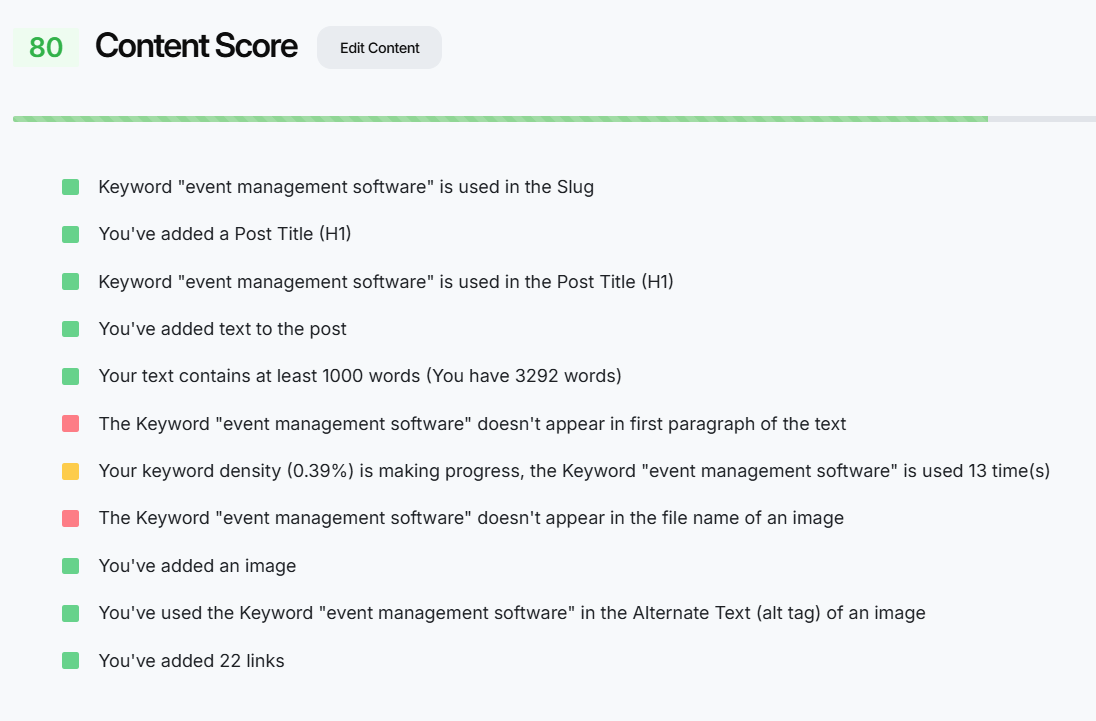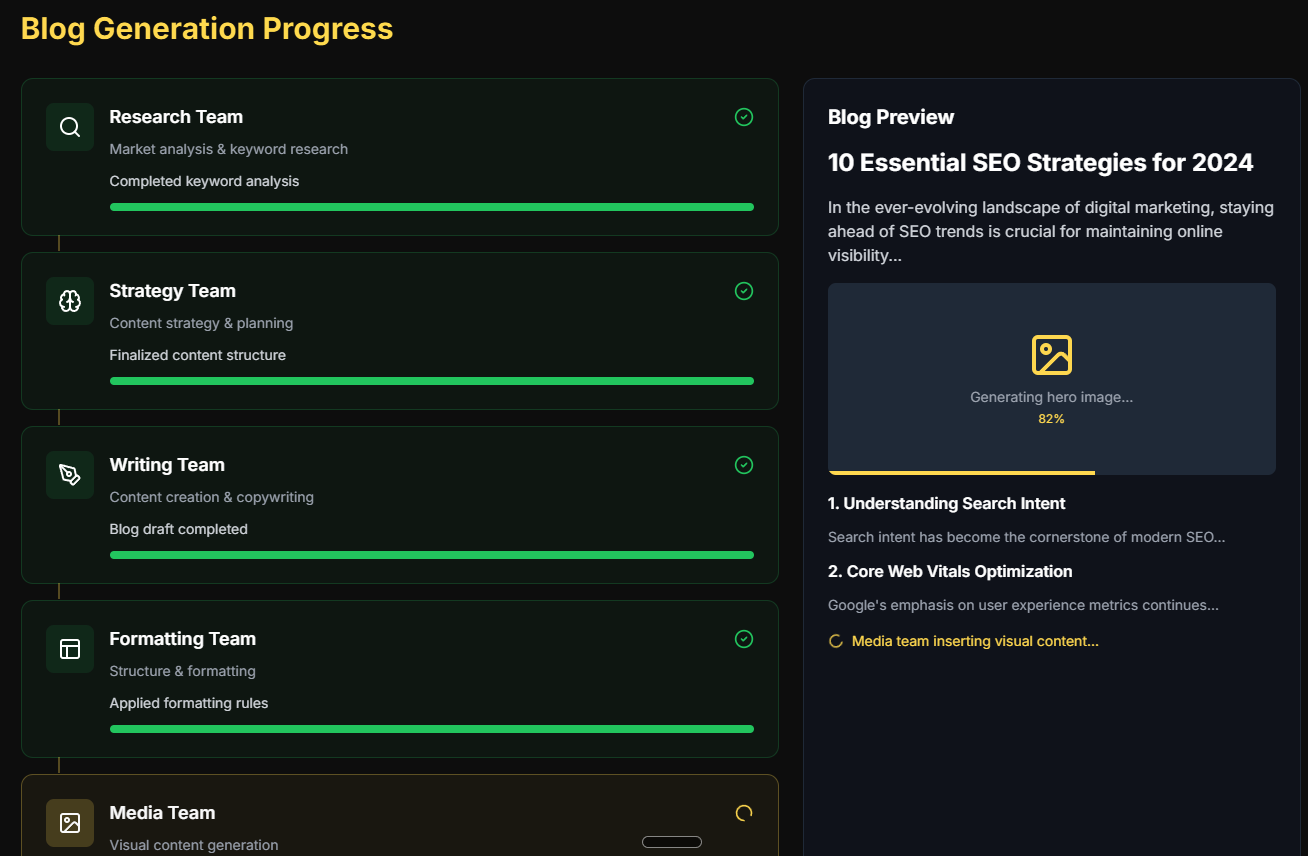If you’ve ever wondered why your website’s organic growth seems stuck, you’re not alone. Many businesses struggle to connect SEO activity with real business results, even after investing in tools or agencies.
In my experience, the missing link is often a dedicated SEO strategist—someone who blends technical skills, creative thinking, and commercial focus to drive measurable outcomes. I’ll break down exactly what sets this role apart from other SEO positions, using real-world analogies and practical scenarios.
You’ll get a clear look at the strategist’s daily responsibilities, from research and audits to competitor analysis and agile planning. I’ll also cover the essential skills, qualifications, and tools that top strategists use to deliver lasting value, plus how they adapt to constant search engine changes.
By the end, you’ll know when it’s time to hire an SEO strategist, what business impact to expect, and how to find the right fit for your team. If you want SEO that actually moves the needle, this guide will show you how it’s done.
What is an SEO Strategist?
Definition and Scope of an SEO Strategist
Who’s really steering a company’s growth in Google’s search results? Enter the SEO strategist—the architect driving organic search progress. Unlike those just tracking units or technical fixes, their remit is far broader.
They combine technical expertise with creativity and commercial insight, building SEO roadmaps that actually serve big business goals—never just chasing traffic for its own sake. Every day is filled with competitor analysis and keyword research, but the lens is always on organic revenue, leads, and market share.
A well-crafted SEO roadmap is more than just a to-do list; it’s a strategic tool that aligns your SEO efforts with business goals, secures stakeholder buy-in, and drives measurable results.
The strategist doesn’t get sidetracked by vanity metrics. Their job is about making sure content and technical efforts consistently deliver measurable business impact. And here’s the thing: being proactive is absolutely core. They routinely scan KPIs and market shifts, ready to pivot strategy whenever search engines shake things up, safeguarding outcomes or grabbing opportunities.
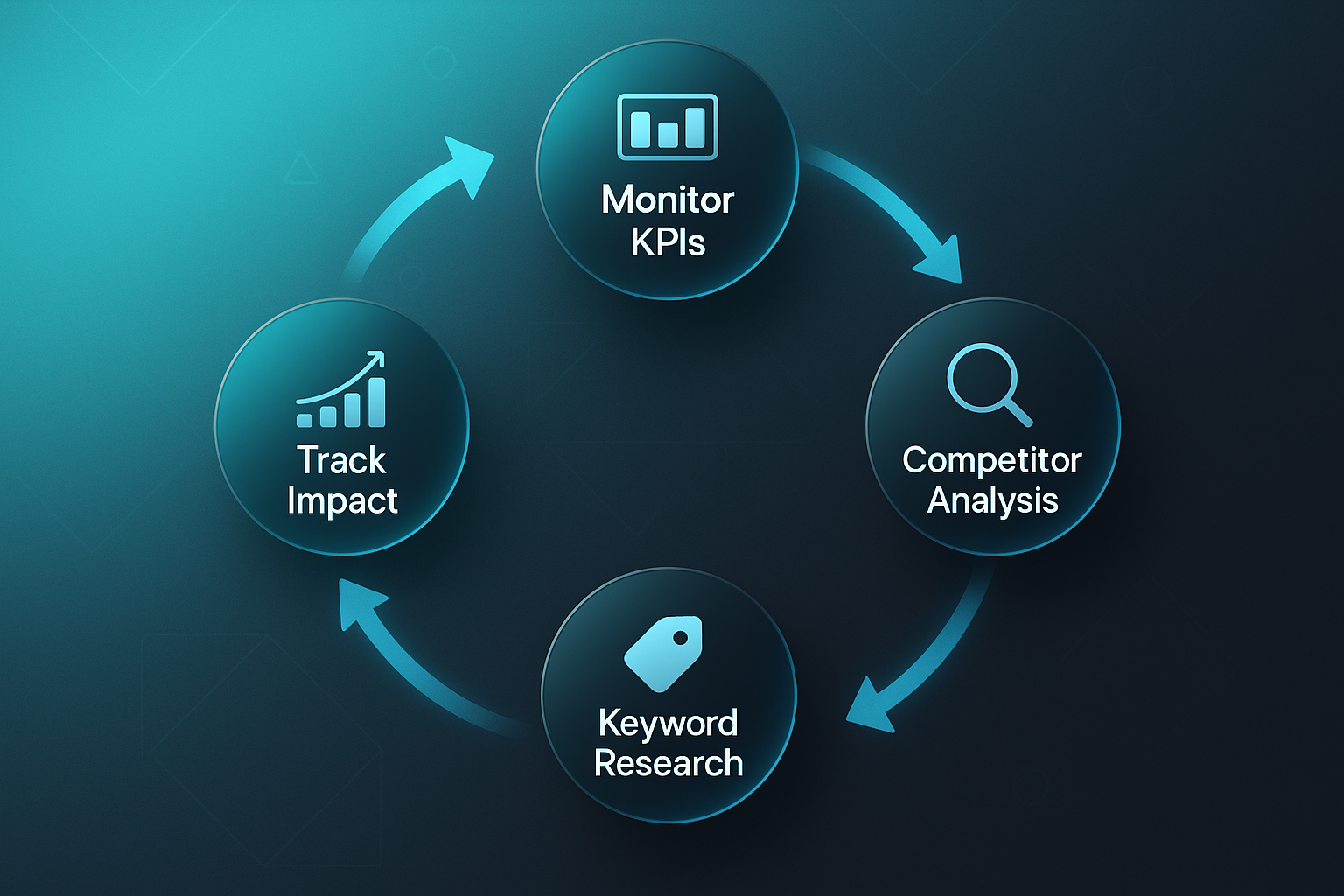
How an SEO Strategist Differs from Other SEO Roles
So what’s different about the strategist’s role compared to others in SEO? Here’s a quick rundown:
| Role | Strategic Focus | Key Metrics | Main Responsibilities | Decision-Making Scope | Business Alignment |
|---|---|---|---|---|---|
| SEO Strategist | Direction, growth | Revenue, leads, market share | Strategy, alignment, mentoring | High; sets priorities | Direct; tightly linked |
| SEO Specialist | Task execution | Rankings, organic traffic | Site optimisation, fixes | Moderate; executes tactics | Indirect; broader support |
| SEO Analyst | Data/reporting | Traffic trends, conversion | Analysis, reporting | Low; informs decisions | Indirect; performance insight |
| SEO Manager | Teams/projects | Delivery, milestones | Team/process management | High; manages delivery | Direct; ensures execution |
Practical Analogy: The Restaurant Team
Picture the SEO strategist as the executive chef—designing the menu, ensuring every dish fits the restaurant’s vision. Specialists are the cooks, analysts resemble food critics, and managers keep service running.
Team Scenario: Navigating Search Engine Change
If a search engine update disrupts rankings, the strategist adapts fast—rolling out new solutions to protect business outcomes. Specialists implement, analysts measure, managers rally.
What stands out is a strategist’s big-picture vision, smart prioritisation, and drive to ensure every SEO action leads to meaningful business results.
Core responsibilities of an SEO strategist
Research and planning
So, what really underpins a successful SEO strategy? At the centre, it's a relentless focus on ongoing research and genuinely thoughtful planning. Without this, even the most creative tactics quickly lose momentum.
A successful long-term SEO strategy involves a continuous cycle of identifying traffic-stealing competitors, finding untapped opportunities, and creating outperforming content based on those findings.
That's why an SEO strategist treats research as a perpetual cycle. Every fresh piece of data, new trend, or change in audience behaviour becomes a navigational tool, shifting the strategic compass as needed.
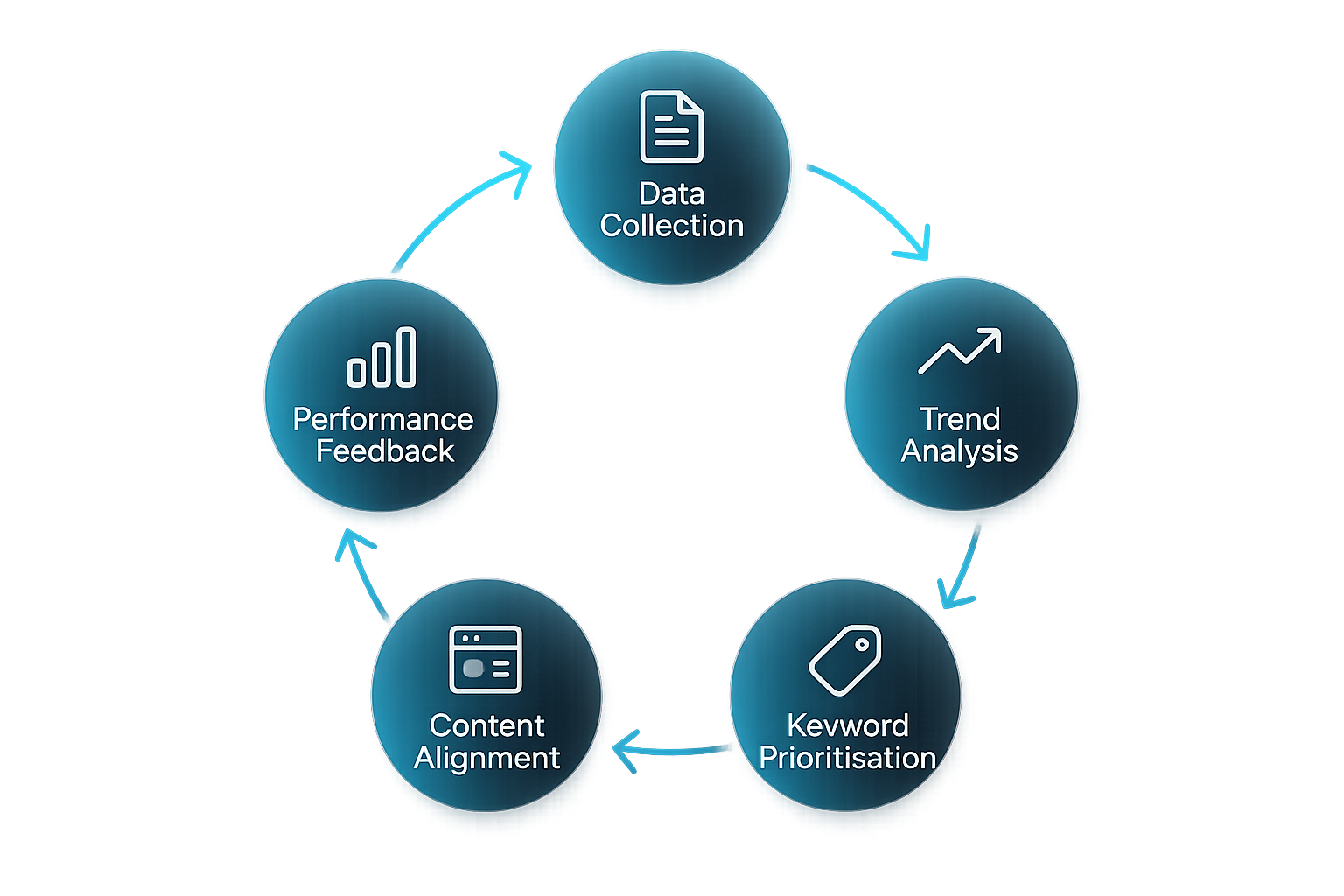
You might be wondering: what does this look like in practice? The cornerstone is keyword research. But this isn't just about picking popular search terms—it's about pinpointing the very queries real customers type, then connecting these to business objectives.
Strategists reach for specialist tools to weigh up keyword relevance, search volume, and how fierce the competition is. And here’s the thing: priorities aren’t fixed. Search trends move with the seasons, breaking news, or as customers’ curiosity shifts.
That’s why strategists constantly scan for new terms and shifting intent, positioning content or product pages to catch the next wave of demand. It’s this agile approach that often reveals high-impact opportunities before anyone else spots them.
If research is the engine, audits are the tune-up. SEO audits happen regularly, but they're much more than box-ticking. There are technical audits—think of these as a full MOT for your website, covering speed, mobile-friendliness, crawling, and structured data.
Then you have content audits. Here, the strategist inspects the depth, usefulness, and optimisation of every website page. These bigger health checks often occur monthly or quarterly, establishing benchmarks and creating a laser-focused priority list for fixes.
But it gets more hands-on. Spot checks for urgent issues—like broken links or server errors—take place weekly or even daily. This keeps the site in fighting shape between broader reviews.
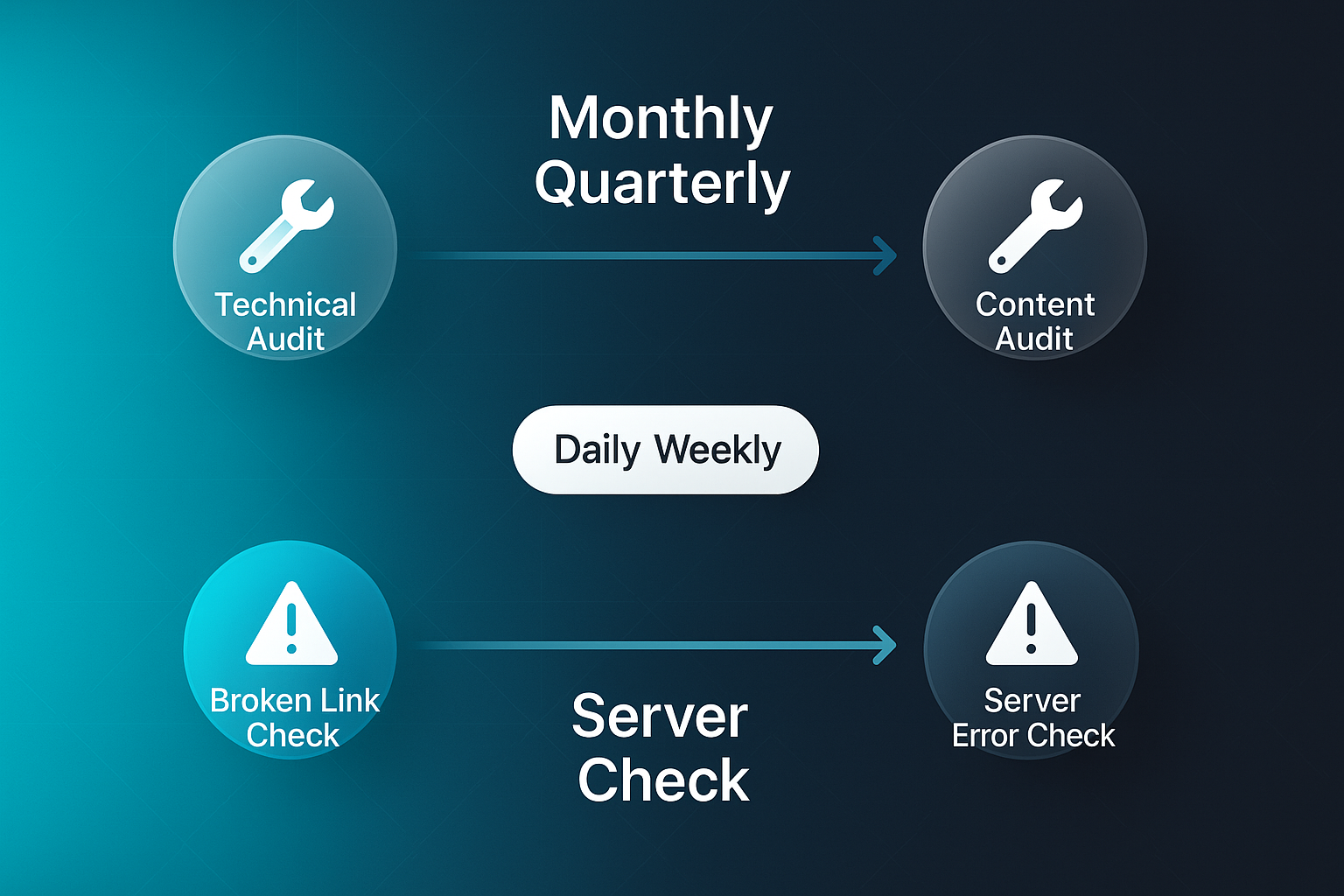
Of course, success isn’t just about looking inward. Competitor analysis is vital—a bit like keeping a radar locked on the market. Dissecting rivals’ keyword rankings, backlink profiles, and technical strengths flags up real opportunities.
Strategies like keyword gap analysis reveal those high-value terms competitors miss. Backlink audits and technical benchmarks uncover tricks you can borrow (or improve upon), making your own strategy smarter.
All these moving parts allow the SEO strategist to quickly pivot and stay tightly aligned with commercial goals, even as the landscape evolves.
Skills and qualifications of an effective SEO strategist
Core skillsets
So, what actually separates an excellent SEO strategist from the rest? The answer lies in how they combine technical know-how, sharp analysis, inventive thinking, and the knack for working seamlessly with others. It’s this blend that equips them to turn SEO efforts into genuine business leaps—something the leading strategists across the UK and Europe have been demonstrating time and again.
Let’s break it down:
- Technical SEO
Fixes issues like speed and crawlability—think ProfileTree’s overhaul for BeyondHR that protected rankings and doubled keyword visibility after a major rebrand. - Analytics Acumen
Uses data-driven insights from platforms like Google Analytics and SEMrush—just like how Embarque helped MentorCruise seize new opportunities, resulting in a 1,600% revenue surge year-on-year. - Content Strategy
Masters advanced keyword targeting and develops authority, as seen in Embarque’s BlueTally project, where pinpointed content and technical upgrades led to over 14,000% organic growth. - Collaboration & Communication
Brings departments together—ProfileTree’s collaboration with Cathedral Eye Clinic merged SEO, content, and video expertise, positioning them as sector leaders. - Research & Problem-Solving
Always up to speed with algorithm shifts and competitor activity, quickly diagnosing issues and uncovering innovative growth openings—a must for sustainable success in Europe’s varied digital landscape.
But skills in isolation aren’t enough. Proficiency with essential SEO tools like Google Analytics, Search Console, and SEMrush is absolutely standard—for strategists, it’s as basic as a tradesperson knowing their tools. Being able to read core site code and deliver clear, meaningful reports also falls into the “must-have” category.
What really counts, though, is the actual impact these abilities create. When businesses see a flood of new signups, soaring revenue, or their brand climbing into market-leading visibility, that’s the real measure of an SEO strategist’s value. And, honestly, that’s precisely what sets a top-tier SEO strategist apart.
Business value delivered by an SEO strategist
Driving organic visibility and growth
So, what’s the real payoff from a skilled SEO strategist? It’s lasting, scalable growth—delivered by targeting search terms your actual prospects use. The focus isn’t on chasing random traffic; it’s on drawing visitors who convert.
And the figures? They’re striking. SEO averages £17–£18 for every £1 spent, decisively leading all digital channels. In real estate and financial services, some see ROI above 1,000%, often recouping investment inside a year. If you can claim those top Google slots, you’ll catch click-through rates up to 26%. Even more impressive—SEO leads close at almost nine times the rate of outbound.
- Website traffic and lead generation
Strategists home in on relevant keywords, driving qualified leads and sustained traffic. - Conversion rate improvements
Content and landing pages are tailored to intent, maximising conversions from visitors ready to act.
Building brand trust and authority
But here’s a twist—authority is the true growth engine. The right strategist develops a long-term content plan, fortifying your reputation and demonstrating expertise to both humans and Google’s algorithms. As trust builds, visibility only increases—creating a self-feeding loop.
- Quality content’s impact on brand perception
Strategic content bolsters credibility, building trust that endures with your audience and search engines. - Long-term resilience to search engine changes
Flexible strategies help ensure steady rankings and soft landings when updates occur.
Cost efficiency and ROI
Want a cost advantage? Strategic SEO slashes customer acquisition costs by over 60% versus outbound methods and delivers returns for years. SEO leads routinely convert at nearly four times the rate of paid search. While paid ads often yield just £1.60 per £1, SEO returns a standout £17–£18—real, sustainable growth.
- Lower customer acquisition costs
SEO pulls in affordable, high-quality leads, outperforming paid channels. - ROI versus paid channels or unmanaged SEO
Strategist-led campaigns build returns year after year, compounding growth with staying power.
How SEO strategists improve website visibility and organic traffic
Holistic keyword and content strategy
Let’s talk about what SEO strategists really do to make websites noticed. They don’t just scatter random keywords—they build tightly connected topic clusters. Picture a central pillar page about cloud accounting, surrounded by focused articles tackling specific, real-life questions for users.
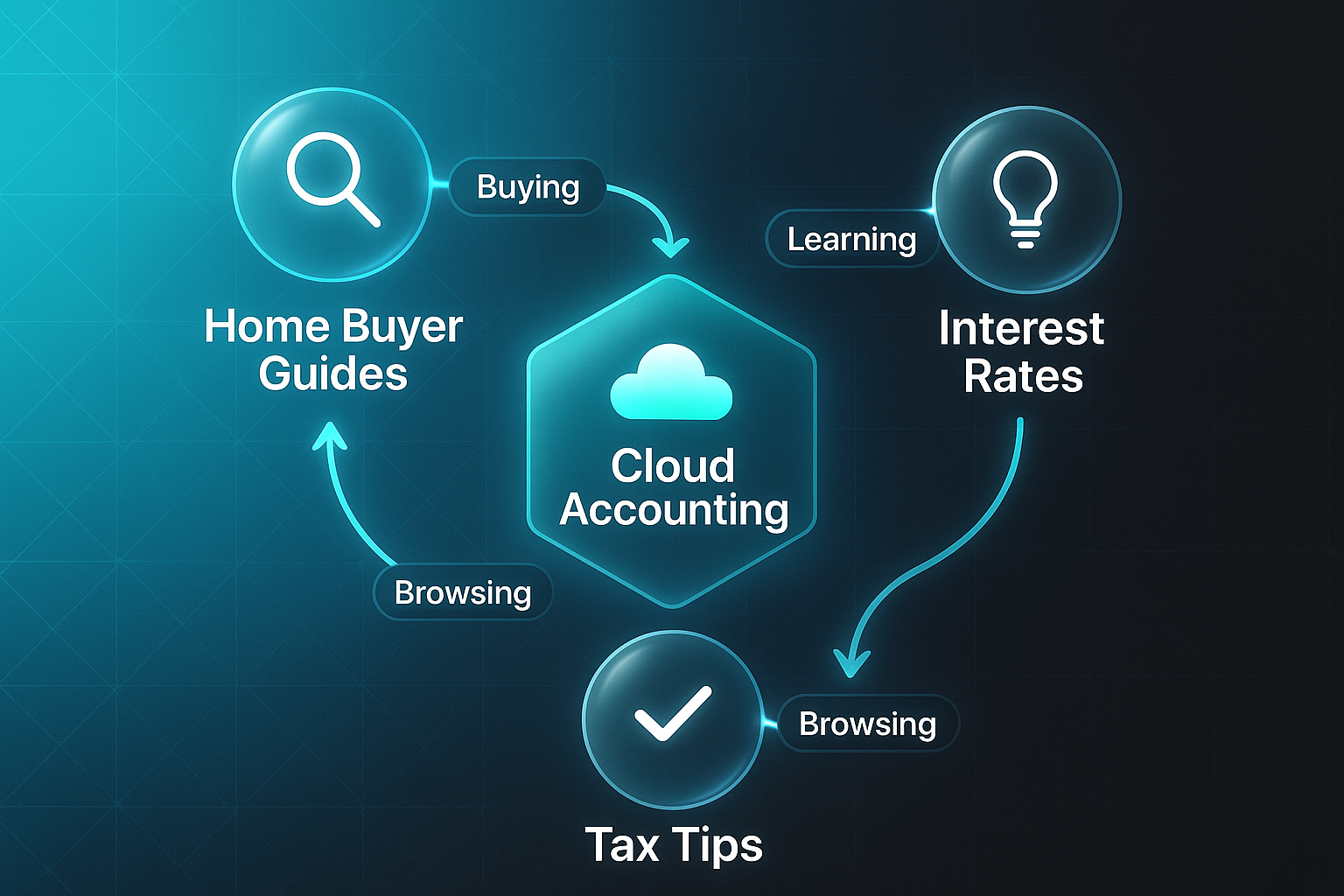
Why does this matter? By mapping content to actual user intent—whether buying, learning or browsing—they help readers genuinely find what they need. So, a finance site would thread together home buyer guides with deep dives on interest rates, capturing both broad interest and niche long-tail searches.
And here’s the reward: this strategy earns sites greater topical authority, which Google’s algorithms notice. Stronger rankings naturally follow.
Blog-in-one-minute
Add a fully SEO-optimised blog to your website with just 2 lines of code.

Technical and structural optimisation
Site health remains integral. SEO strategists constantly run technical audits, fixing crawl issues, boosting page speed, enforcing HTTPS, and polishing mobile usability.
Structured data—like schema markups—gives search engines a clearer sense of your website’s true meaning, which is vital for local businesses. Retailers who nail mobile speed and usability often see a jump in organic traffic, since visitors and search engines both favour a seamless experience.
Link building and local SEO efforts
Let’s not forget about linking. Internal links between topic clusters spread authority and help users discover content more easily.
Externally, strong backlinks from respected local domains—say, industry publications—propel reputation and rankings. For local SEO, those tailored landing pages and accurate Google listings, paired with tools like hreflang tags or schema, help multi-location businesses climb regional search results and attract more local enquiries.
Adapting to changing SEO trends and technology
Staying ahead of algorithm updates
Search engine algorithms never sit still. Google’s core updates now elevate people-first, research-backed content and crack down on low-value, AI-generated material.
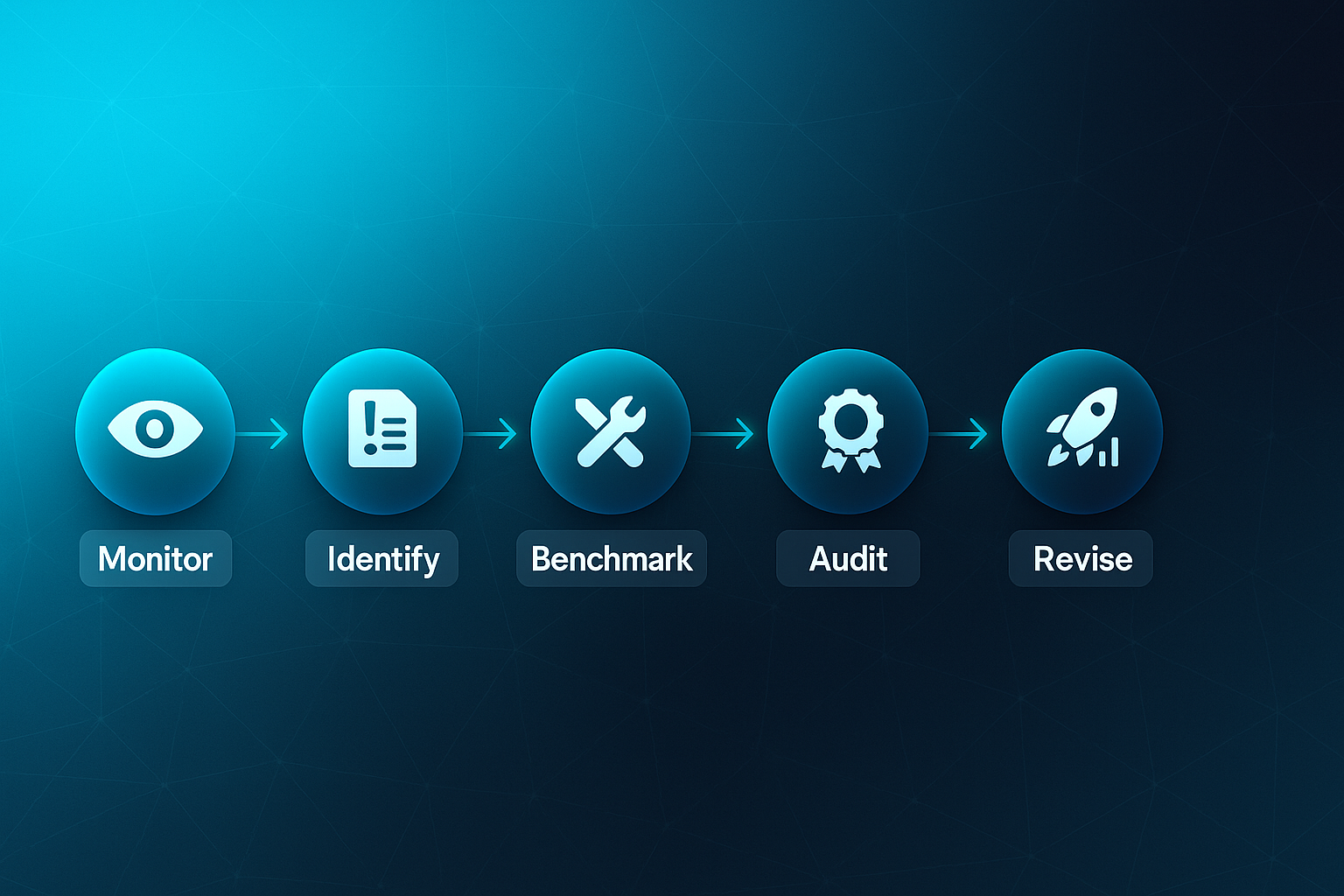
So, how do SEO strategists keep up? They’re tuned into official Google channels, analytics dashboards, and industry forums—always watching for ranking shifts and performance blips.
Once an update lands, the detective work starts. Which pages slipped? Which keywords dropped off? They quickly benchmark against competitors, hunting for content gaps and technical issues like slow loading or Core Web Vitals problems.
Misses on E-E-A-T—Experience, Expertise, Authoritativeness, Trustworthiness—get immediate attention. Content is revised for quality and originality, and authoritative touches or citations are strengthened.
Upgrading mobile experience is routine. Every change is a springboard—refining strategy to sync with new ranking signals, while never losing sight of business goals.
Embracing new technologies and user patterns
User habits are evolving at record pace. Mobile-first browsing and voice search mean people are searching in fresh, conversational ways.
That’s why strategists prioritise long-tail queries, bulleted lists, and FAQs—not just for clarity, but to nail voice results and accessibility. Schema markup and structured data have become must-haves for rich results, signalling value to search engines.
In an AI-driven world, that mix of technical mastery and proven expertise is what keeps websites both trusted and visible—whatever seismic changes come next.
When and why should a business hire an SEO strategist?
Common triggers for hiring
So, when does it make sense to bring in an SEO strategist? The answer usually emerges when automated tools or agencies just aren’t delivering results. There’s a tipping point—like a plateau or decline in organic traffic—where routine fixes simply don’t cut it. That’s the cue for a strategist to step in with tailored, business-savvy solutions.
Major events also call for expertise. Launching a website, rebranding, or scaling quickly? These pivotal moments need smart oversight. Involving a strategist early shapes technical and content foundations for real growth—helping you avoid costly errors.
- Traffic plateaus or declines
When fixes don’t work, a strategist tackles what’s blocking growth. - Complex launches or rebrands
Input at the outset prevents ranking losses and ensures a strong start. - Cross-team integration needs
Orchestrates SEO with UX, product, and brand teams.
Benefits over agency or tools-only approaches
But what sets a strategist apart from agencies or automation? In-house strategists work right in your business, collaborating with your teams and aligning every campaign to your goals.
Automation’s great for checks, but can’t match the nuanced judgement or big-picture strategy required for lasting gains. Take Zapier—for them, hiring a Head of SEO after agency efforts flopped sparked agile content systems and revived their traffic.
- Tailored, strategic focus
Solutions crafted for your unique objectives. - Faster, context-aware action
Issues are resolved quickly, using smart automation judiciously. - Proven impact: Zapier case
Strategic leadership transformed stagnation into outstanding growth.
The role of automation and AI in SEO strategy: Tools and best practices
What automation and AI tools can (and cannot) do
Automation and AI have reshaped SEO, lightening the load on repetitive tasks. Modern tools handle bulk keyword research, technical audits, competitor tracking, and link outreach with impressive speed. AI can even spin up draft content or quick-fire optimisations for intent and readability.
But here’s the thing: speed alone doesn’t build brand strength. For sharp strategy, distinctive messaging, or creative pivots, you still need a human touch. Automated systems crunch data, but only strategists navigate ambiguity, editorial polish, and genuine relationship-building.
| SEO Task | Best for Automation | Best for Strategist |
|---|---|---|
| Keyword research & SERP tracking | ✔ | |
| Technical site audits | ✔ | |
| Content draft generation | ✔ | |
| Link prospecting/outreach | ✔ | |
| Brand storytelling | ✔ | |
| Campaign design & pivoting | ✔ | |
| Editorial review | ✔ |
Recommended platforms and tools for SEO strategists
Let’s break down the toolkit. SEOSwarm leads agentic platforms—combining fast auditing, automated keyword clustering, and instant site builds, but it’s always the strategist who steers the ship.
Other essentials? SEMrush covers campaign management, Ahrefs shines with backlinks and keyword intel, SurferSEO amps up on-page optimisation with AI, ScreamingFrog excels in technical crawling, and Clearscope ensures your content matches trending, semantic searches.
| Platform | Core Strength | Key Feature |
|---|---|---|
| SEOSwarm | SEO automation & content | Instant scalable blog/site launch |
| SEMrush | Comprehensive campaigns | Keyword, competitor, audit suite |
| Ahrefs | Backlink/keyword research | Industry-leading link database |
| SurferSEO | Content optimisation | AI-driven SERP analysis |
| ScreamingFrog | Technical SEO | Deep site crawling |
| Clearscope | Semantic content quality | Trending keyword coverage |
A synergistic workflow: Human expertise + AI/automation
The magic happens when automation tackles repetitive checks—like audits and SERP analysis—whilst strategists lead with creative, brand-aligned decisions.
A key challenge in leveraging artificial intelligence for SEO is balancing automation with human insight, as an over-reliance on AI may present significant drawbacks.
Let AI inform you, not dictate moves. Frequent review keeps campaigns sharp, on-brand, and ahead of change. That’s how teams combine speed with true brand uniqueness for lasting results.
| Process | Automation Adds | Strategist Ensures |
|---|---|---|
| Research | Scale and speed | Prioritisation, trend insight |
| Content creation | Drafts & optimisation | Originality, brand voice |
| Technical SEO | Rapid diagnostics | Strategic fixes, compliance |
| Performance tracking | KPI automation | Campaign evolution |
Comparing in-house, agency, and automation-led SEO: Costs, ROI, and scalability
Cost and ROI: What do you really get for your investment?
Let’s face it—budget usually leads the discussion when you weigh up SEO options.
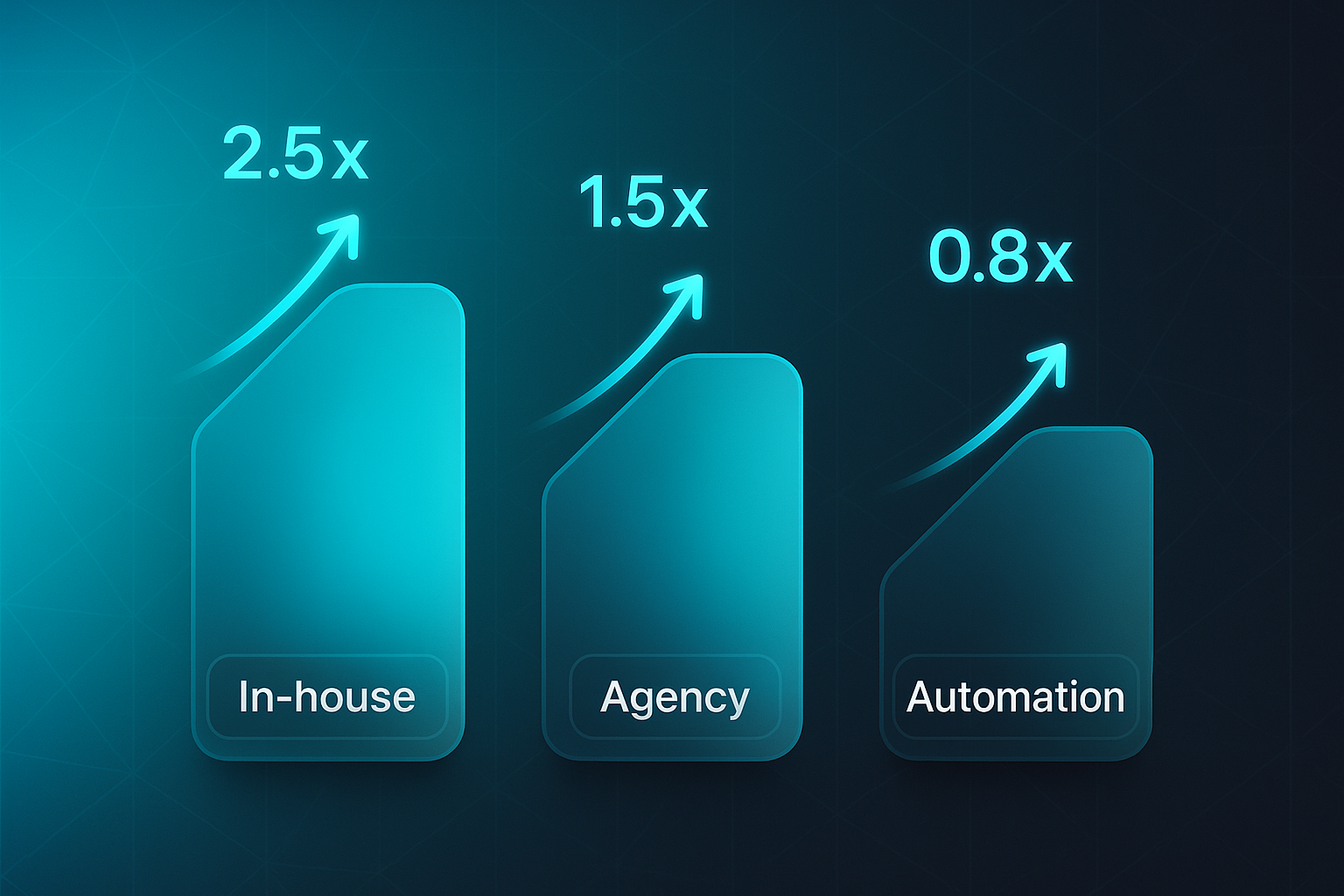
Hiring in-house brings a hefty up-front cost. You’re paying a salary of £35k–£80k in the UK, plus benefits.
Agencies aren’t exactly easy on the pocket either. Expect monthly retainers from £1k, rising to £10k or more for big brands.
You do get predictable monthly billing, but you’ll always be one of many clients.
Automation-led platforms appear cheap—sometimes £99 a month. But here’s the thing: without a dedicated strategist, it’s easy to spend on activity that doesn’t really shift the dial.
So, what about returns? In-house strategists shine if you need day-to-day alignment and SEO is mission-critical.
Agencies bring pace, but the best ROI comes when campaigns are deeply customised.
Automation handles tasks at speed—yet rarely the nuanced work that drives major organic revenue.
Scalability and resource allocation
How will you handle rapid scaling?
In-house teams offer consistency and brand knowledge, but aren’t always agile if priorities shift.
Agencies are fast to ramp up, launching projects or testing new markets. Automation gives power to blitz checks and fixes but struggles creatively.
Business fit: Startups vs. enterprises vs. niche markets
Startups often favour agency or automation, trading some uniqueness for rapid gains.
Large or multi-market companies, especially in regulated sectors, benefit most from a hands-on strategist.
For niche B2Bs, the hybrid—strategist using automation—often hits the sweet spot.
Comparison summary: Decision guide
In-house maximises ROI and alignment. Agencies are fast and versatile.
Automation brings scale but risks superficiality.
Most lasting success comes with a strategist orchestrating both automation and agency partners.
So ask: is your top priority cost, speed, authority, or that unique strategic edge? Your answer unlocks the best fit.

AI-Powered Content Strategy
See the AI platform that's replacing entire content teams (with better results).
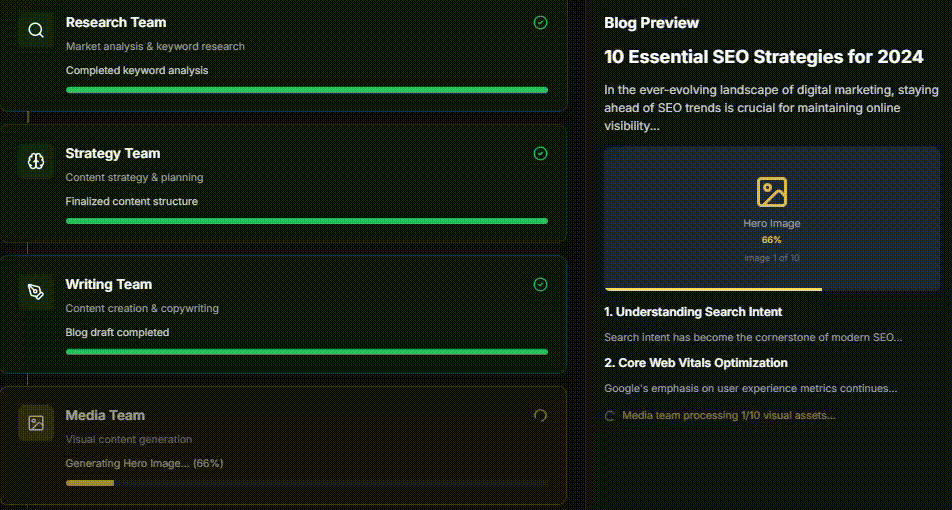
How to select and hire the right SEO strategist
Evaluation criteria
Choosing an SEO strategist isn’t just about ticking boxes for technical skills or fancy titles. The real litmus test? Proven strategic results. Always ask for concrete case studies—actual ranking lifts and measurable growth, not vague claims.
You want someone fluent in the top tools—SEMRush, SEOSwarm, Screaming Frog—who can also explain their thinking clearly, with zero jargon. That blend of analytics and communication is what drives meaningful results in practice.
How do you know they’ll stay ahead? Give extra weight to candidates who pursue fresh certifications, are involved in industry circles, and keep watchful for the next algorithm or AI shift.
While formal qualifications help, the best signs are hands-on, relevant outcomes—especially in fast-changing markets.
Assessment process
Getting the right fit means digging into more than just know-how. Lead with scenario-driven questions to uncover practical thought, adaptability, and how they respond to real sector challenges.
Reference checks and teamwork stories reveal collaboration style. The best SEO strategist isn’t just technically adept, but one who fits your team’s energy and makes a clear difference day-to-day.
Integrating SEO strategists into your team
Collaboration touchpoints
- Content team collaboration
Shape briefs around keywords and sync calendars so SEO and content campaigns truly pull together. - Working with development teams
Translate technical needs into prioritised tasks, tracking fixes in Jira, Trello or similar tools. - Marketing and PR coordination
Weave SEO insights into campaigns, amplifying reach and ensuring messaging stays consistent everywhere. - Reporting to leadership
Deliver sharp dashboards and updates, securing senior buy-in with clear business impact. - Shared tools and workflows
Use collaborative platforms for real-time visibility and seamless teamwork onsite or remote. - Resolving silos
Host regular cross-team sessions, using data to align priorities and resolve issues before they block progress.
Career paths and future outlook for SEO strategists
Typical progression stages
Most SEO strategists kick off as assistants or specialists, concentrating on on-page optimisation, keyword research, and reporting. Progression brings roles like SEO analyst or team lead, blending audits, project management, shaping site architecture, and mentoring colleagues. Senior posts—SEO strategist, SEO Manager, or Head of SEO—focus on driving search strategy and leading cross-functional teams. Alternatively, some go independent or specialise in eCommerce or healthcare for a deeper market impact.
Importance of ongoing skill development
How do you keep advancing? Continual learning is critical—industry certifications, events, and adaptability to changing search tech fuel lasting progression in this fast-evolving landscape.
My Final Thoughts on Being an SEO Strategist
A great SEO strategist doesn’t just chase rankings—they connect every technical fix and content move to real business growth. I’ve seen the difference firsthand: the most effective strategists blend sharp analysis, creative thinking, and relentless adaptability to keep your website ahead, even as algorithms and user habits shift.
If you’re ready to move beyond surface-level SEO, here’s my advice: look for a strategist who can show proven results, communicates clearly, and thrives on collaboration. Ask for case studies, dig into their process, and make sure they’re as invested in your goals as you are.
SEO isn’t a set-and-forget task—it’s a living strategy that should evolve with your business. The right strategist will turn uncertainty into opportunity and make every search click count for your bottom line.
— Wil



